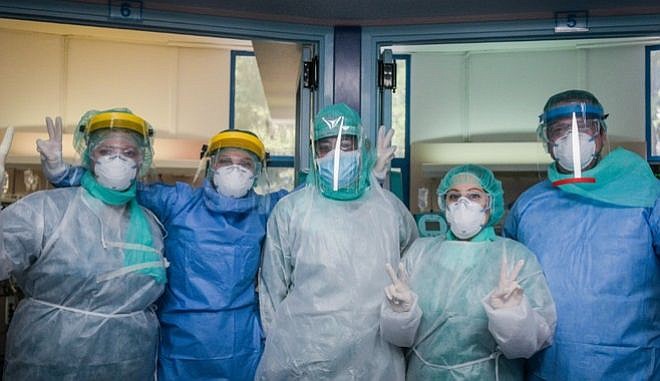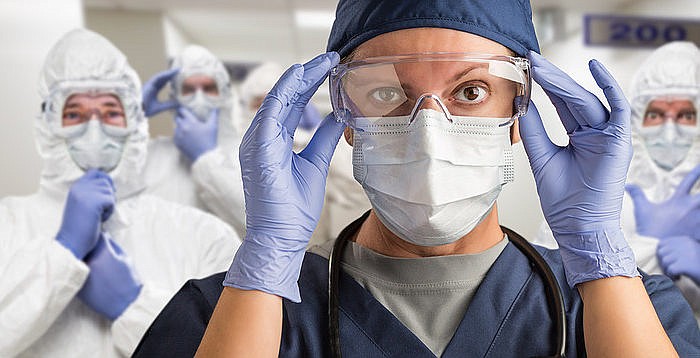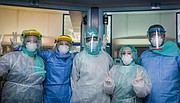A word for frontline healthcare workers
A couple months ago I had a conversation with a frontline healthcare worker about the issues with wearing Personal Protective Equipment (PPE) for hours and hours. Her wardrobe goes beyond just a mask. Face visor, goggles, respiratory are essentials of the job to protect her against SARS-CoV-2 Virus (yes, in our conversation I learned that it’s not simply, “COVID.”)
She reported that among herself and coworkers the long term use of PPE and the friction on the facial skin was resulting in blistering, skin tears, ulcers, and for a few, reactions to the materials. She told me, “We’ve tried all sorts of moisturizers and repeated applications during their shifts, which is a challenge, and nothing is working!”
I made the suggestion that perhaps facial moisturizers weren’t effective because they are designed to be absorbed into the skin so there isn’t a greasy feel. I told her I would do some research.
The Study
I can now share findings of a recent study in England, prompted by similar situations with frontline healthcare workers there, where researchers were investigating which products created the longest lasting protective layer between PPE and skin. Their findings were interesting and worth trying for these desperate times.
Researchers found that the best lubricants to use are those that don’t get absorbed into the skin and create a long-lasting barrier of protection between skin and PPE. The lead author, Dr. Marc Masen, of the Dept. of Mechanical Engineering (I bet you thought I’d say “Dept. of Dermatology), said: “We think of moisturizers as good for our skin, but commercial skin creams are often designed to absorb into the skin without leaving any residue. While this is fine for everyday moisturizing, our study shows that a greasy residue is precisely what’s needed to protect skin from PPE friction.”
Researchers built an instrument called a tribometer, which assesses friction between two surfaces. They tested commercially available products and tested friction upon application, and then one, two and four hours after application. Then testing commercial moisturizers, they found that friction on application was low, but increased drastically within ten minutes of application. The researchers say this is because the active ingredients, known as humectants, attract water like magnets from the lower layers of skin to the upper ones, leaving it soft, unlubricated, and breakable.
The Findings
Most products initially reduced friction by 20%. Some silicone-based and water-and-glycerin based lubricants actually increased friction levels over time by up to 29% compared to dry skin. They found that the best lubricants to use are those that don't absorb into the skin, creating a long-lasting layer of protection between skin and PPE. They say that non-absorptive creams like coconut oil-cocoa butter beeswax mixtures, and powders like talcum powder, are most likely to provide PPE wearers with long-lasting skin protection.
However, two products reduced friction as time went on: talcum powder reduced friction by 49% on application and 59% at four hours, and a commercially available product comprising coconut oil, cocoa butter and beeswax reduced friction by 31% on application and 53% at four hours. A mixture of petrolatum and lanolin reduced friction by 30% throughout testing.
I cringed reading this because of the occlusive qualities of petroleum and lanolin, and honestly, would never have thought to suggest either. That said, we can only hope that current working conditions will pass sooner than later and the use of these products would be only temporary. Friction can be incredibly damaging for the skin, particularly when applied for an extended period; so it would be worth a try.
The products that don't absorb easily into the skin are the ones that provide a protective layer. In fact, for PPE wearers, it's best to actively avoid creams and moisturizers which advertise a 'non-greasy feel' for a while.
The researchers hope the study will save healthcare workers and other frontline PPE wearers from suffering with the painful and damaging effects of skin friction.
Diana is a certified clinical cosmetologist, cosmetologist, and make-up artist. Diana can be contacted at dianamarienelson1210@gmail.com or follow her on Facebook at Diana Marie Nelson.





